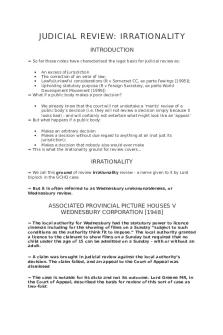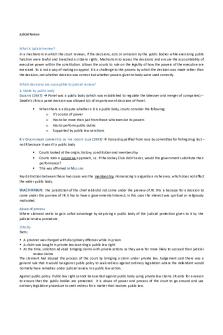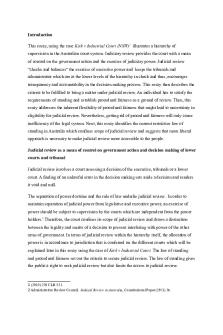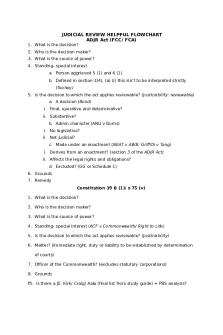Judicial Review- irrationality PDF

| Title | Judicial Review- irrationality |
|---|---|
| Course | Constitutional and Administrative Law |
| Institution | University of Exeter |
| Pages | 4 |
| File Size | 108.4 KB |
| File Type | |
| Total Downloads | 41 |
| Total Views | 134 |
Summary
summary of notes from readings and lectures...
Description
JUDICIAL REVIEW – IRRATIONALITY This case is the standing precedent:
Associated Provincial Picture Houses v Wednesbury Corporation [1948]
The local authority for Wednesbury had the statutory power to licence cinemas including for the showing of films on a Sunday subject to such conditions as the authority think fit to impose. The local authority granted a license to the claimant to show films on a Sunday but required that no child under the age of 15 can be admitted (with or without an adult) Challenged this in the courts Challenge was unsuccessful but Lord Green advised on when the courts would step in in regards to irrationality. Held: once the ultra vires concept is established i.e. once it is determined that the public body hasn’t acted unlawfully in an illegality sense. The courts will interfere if the decision is so unreasonable that no reasonable authority could have ever come to it. GROSSLY UNREASONABLE
Lord Diplock’s definition: ‘a decision that is so outrageous in its defiance of logic or accepted moral standards that no sensible person who had applied his mind to the question to be decided could have arrived at it.’
R (Bradley) v SOS For Work and Pensions [2008]
The government issued guidance on pensions -guidance that was seriously flawed in that it creates the impression that certain types of pension product were secure and well-funded, when they were not. The Government also changed ‘minimum funding requirements’ for such pensions, which only exacerbated the financial losses later experienced by the pension product holders. The PO investigated the scandal and delivered a most damning report, alleging maladministration on the part of the Government occasioning serious injustice and considerable financial losses 9losses have since been assessed in the Billions of pounds) The Minister rejected the report’s findings in its entirety Judicial review was on the rejection of the report by the minister. HELD: rejection of the report was Wednesdbury standard of unreasonable. Whilst the minister was not bound by the report’s specific recommendations he had to face up to the report and explain his position- not dismiss the report out of hand.
R v Secretary of State for the Environment, Ex parte Nottinghamshire County Council [1986]
The minister (Secretary of State for the Environment) produced a report on local authority funding, which was approved by the House of Commons in a vote (not an Act of Parliament) The report was implemented, allowing for central government contributions to local authorities to be determined with reference to the financial prudence of the local authority in the previous financial years. Public body judicial reviewing another public body HELD: failed at judicial review, Lord Scarman: ‘I cannot accept that it is constitutionally appropriate, save in very exceptional circumstances for the courts to intervene on the grounds of unreasonableness to quash government guidance framed by the Secretary of state and by necessary implication approved by the House of Commons’ Central government policy which has the support of Parliament is not allowed to be reviewed in court.
DEFERENCE
Government policy – particularly where it has been subject to parliamentary scrutiny – will rarely give rise to interference from the Courts.
This deference is ‘due deference’ because Parliament, is the constitutionally appropriate body to scrutinise central government policy.
In Wednesbury contexts this is sometimes referred to as ‘Super-Wednesbury’ review or ‘light touch’ review.
WEDNESBURY REVIEW
R (Daly) v Secretary of State for the Home Department [2001]
Claimant was a prisoner who kept confidential and legally privileged correspondence in his prison cell. Prison regulations required that prisoners be absent whenever routine searches of prison cells were conducted. The claimant objected on the grounds that this would compromise the privilege of his correspondence and make such letter’s available for the prison officers to see. Brought on the grounds that this act was unreasonable because it interferes with the confidentiality and that it interfered with the Human Rights Act right to privacy. HELD: High Court refused ‘leave’ or ‘permission’ to hear the case
o The CoA gave permission but dismissed the application o On appeal to the House of Lords, the claimant won This is substantive Wednesbury review (not merely illegality review understood as ultra vires etc.) because the SoS has the discretion in law to create prison rules such as these The ‘substance’ of the decision was under scrutiny and was deemed unlawful on two grounds o It was, on common law principles, (irrationality) flawed o It was a disproportionate exercise of discretion on Human Rights Act grounds
Continued…
The courts said that the common law right to confidentiality of legally privileged correspondences meant that the court would ‘anxiously scrutinise’ the decision.
This type of Wednesbury review was called.. ANXIOUS SCRUTINY
A common law protected ‘constitutional right’ needs to be engaged Where it is, the courts will insist that the public body will provide justifications for the infringement of the right Different to the standard of Wednesbury review o SIGNIFICANTLY, the court turns to D and requests a justification – such a culture is (outside of HRA contexts) largely unknown to public law. If D cannot provide adequate justifications for the infringements of the common law protected right, the decision is unlawful on Wednesbury Grounds.
SUPER WEDNESBURY
Does the context in which decisions have been made induce ‘due deference’ to the decision-maker?
WEDNESBURY
Has the public body acted so unreasonably that no public body acting reasonably could have come to that decision
ANXIOUS SCRUTINY
Are common law constitutional rights engaged? If yes, does D have justifications for infringing upon that right....
Similar Free PDFs

Judicial Review- Irrationality
- 6 Pages

Judicial Review- irrationality
- 4 Pages

Judicial Review
- 15 Pages

Judicial Review
- 50 Pages

Judicial Review
- 6 Pages

Judicial Review
- 40 Pages

Judicial Review
- 7 Pages

Judicial Review Complete 2
- 54 Pages

Judicial Review (ALL!)
- 8 Pages

Judicial Review notes
- 1 Pages

Analisis Sejarah Judicial Review
- 5 Pages

ADMIN LAW Judicial Review
- 5 Pages

Ilegality - Judicial Review
- 5 Pages

Judicial Review Notes
- 6 Pages

Judicial Review Essay
- 3 Pages
Popular Institutions
- Tinajero National High School - Annex
- Politeknik Caltex Riau
- Yokohama City University
- SGT University
- University of Al-Qadisiyah
- Divine Word College of Vigan
- Techniek College Rotterdam
- Universidade de Santiago
- Universiti Teknologi MARA Cawangan Johor Kampus Pasir Gudang
- Poltekkes Kemenkes Yogyakarta
- Baguio City National High School
- Colegio san marcos
- preparatoria uno
- Centro de Bachillerato Tecnológico Industrial y de Servicios No. 107
- Dalian Maritime University
- Quang Trung Secondary School
- Colegio Tecnológico en Informática
- Corporación Regional de Educación Superior
- Grupo CEDVA
- Dar Al Uloom University
- Centro de Estudios Preuniversitarios de la Universidad Nacional de Ingeniería
- 上智大学
- Aakash International School, Nuna Majara
- San Felipe Neri Catholic School
- Kang Chiao International School - New Taipei City
- Misamis Occidental National High School
- Institución Educativa Escuela Normal Juan Ladrilleros
- Kolehiyo ng Pantukan
- Batanes State College
- Instituto Continental
- Sekolah Menengah Kejuruan Kesehatan Kaltara (Tarakan)
- Colegio de La Inmaculada Concepcion - Cebu
